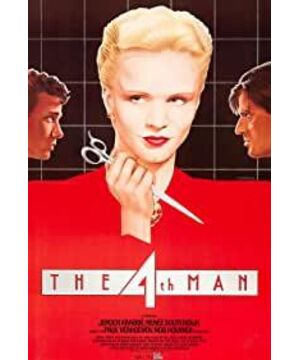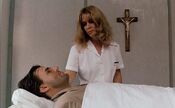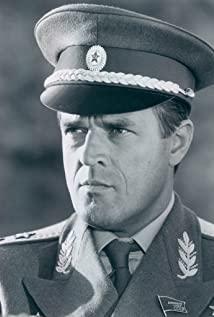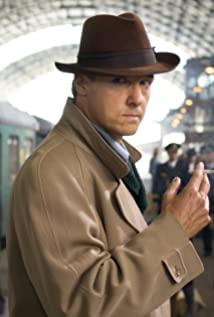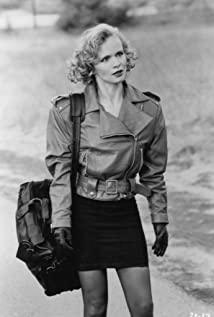Paul Verhoeven has been shooting some low-budget films in the Netherlands. He went to Hollywood at the invitation of Spielberg. He started with B-movies, and gradually he became famous and famous internationally. This director has one hand in science fiction, one hand in erotica, and one in war. He has made good achievements in three fields. His films are fragrant and violent, suspense and weird, and there is always a kind of wildness and magnanimity from the European continent. Verhoeven's unrestricted, daring and daring style has already emerged in his early works, such as "The Fourth Man", which won the 10th Los Angeles Film Critics Association Award for Best Foreign Language Film in 1984. There is a whimsical idea of ripping off Jesus' pants.
A writer was invited to a city for book signings and speeches, and had an affair. Unexpectedly, the other party was a black widow. She had murdered three husbands. She was about to turn the writer into the fourth victim. , this is the main body of the story of "The Fourth Man". Verhoeven added psychological thriller, erotic rendering, and religious redemption to this simple story, making a lecturing trip dreamy, coquettish and thrilling. The protagonist, Gerald, is a writer, which is the director's narrative strategy. One is that most of the writers are sensitive people with rich imagination and are easy to accept hints, which provides convincing force for many mysterious experiences such as spiritual vision, fantasy and premonition in the film; the other is that the writers are more romantic, and the scale of love and sex is higher than that of ordinary people. It is much broader. In their view, there is no difference between beauty. The beauty of women and the beauty of men are both beauty. In their view, there is no difference in love. It is love to love women and men. The director set Gerald as Bisexuality, both men and women are open to all who come, which reflects the greed of lust, which opens up many new possibilities for the direction of the story; most of the three writers are extreme people. Many writers claim to have "reached the end of mankind", that is, the body has broken through the boundaries of ordinary people's senses, the mind has broken through the boundaries of ordinary people's psychology, and they have reached a world outside common sense. They are all explorers and are keen to explore. In the New World, they are mostly eccentrics who act in extreme ways in the eyes of ordinary people. The extreme nature of the characters facilitates the stunning narrative. ---It is such a person who is not immune to desire, thinks and fantasizes, and begins his journey of senses and soul.
Erotica in Paul Verhoeven's films is always tied to a grand narrative. The "Starship Troopers" team members are trying to save a planet while they are lingering. In "Black Book", Alice's debauchery is about destroying the Nazis. "Instinct" and "Turkish Carnival" explore the sexual instincts like the original sin of human beings in the overflowing flesh, and in "The Fourth Man", eroticism is inseparable from the two major themes of death and religion. In Gerald's journey, death and religious insinuations and visions intersect. The calendar pattern on the train shows Delilah cutting off Samson's hair, implying that the writer is about to step into a trap; the opposite mother uses apple peels to form a circle on her son's head, which is undoubtedly the Virgin and the Son's. symbol. Suddenly, a high-pitched sound of horror was a hotel advertisement on the train. Gerald stared at the photo of the hotel and began to wander. He took the No. 4 key and walked in the dark hotel corridor and found the No. 4 room. Just as he was about to open the door, he found that the door number suddenly turned into an eye. The eye bulged and burst out. Gerald woke up and found that the child on the opposite side threw the tomato juice on the picture - this is the suggestion of the Virgin and Child He was careful about danger. Afterwards, there are a series of ominous pictures such as coffins, the scene of a car accident, drowned people, and falling seabirds.
Gerald hooks up with Christina, and the affair succeeds. Christina's home is a beauty salon called "Sphinx", which is spelled "Spider" because of a problem with the lights, but the two are actually the same thing: both devour their prey. It seems that Gerald entered not a sea-view villa but a magic house, and Christina, the master of the magic palace, is a demon incarnated as a beauty. Christina is very good at luring lambs into the slaughtering ground. She sets up temptations for Gerrard's weaknesses one by one, and seemingly unintentionally shows him a lot of money and pictures of handsome men. Gerald took the bait obediently, especially after discovering that Christina's current boyfriend, Herman, was the handsome sunny guy he couldn't catch up at the station, he didn't hesitate to stay, and did everything possible to meet the man he had always dreamed of. Son. Anxiously awaiting Herman's arrival, Gerald came to the church, where he had another vision. Next is a classic scene that can be seen in history: the statue of Jesus on the cross is transformed into Hermann's healthy and strong carcass, Gerald hugs the handsome man on the cross, rubs affectionately, and pulls down his trousers. Wipe, spring is unbearable. It wasn't until an old woman appeared behind him that he interrupted his thoughts. Gerald is so crazy that he can even take Jesus as the object of his sexual fantasies and make lewd actions. Isn't it outrageous? In fact, this is just another divine revelation: the love of religion must reach the intense and crazy level of worldly love, and the love of Jesus must be as inextricable as loving a handsome guy, in order to be saved. The sect of Jesus opens the door of convenience and is inclusive: those who believe in me will have eternal life, and those who have sex with me will also have eternal life. As long as you come close to me and make me the master of your heart, I will be able to guide you away from the devil and out of the sea of misery.
By the time Herman finally appeared, the film was nearly over. Christina acts as a pimp between Gerrard and Herman, deliberately creating opportunities for the two to get along, and her purpose is nothing more than to make Gerrard sink deeper into the sea of lust. When Gerald and Herman were having an affair in a room in the cemetery, they saw the ashes of Christina's three previous husbands placed in the room, and suddenly realized that the three men were murdered by Christina. The three animals in the slaughterhouse he entered in his Visionary Journey represented the three murdered husbands, and he, as the fourth man to be killed, was waiting for the fourth bucket of blood. A panicked Gerrard persuaded Herman to flee together, but Herman was obsessed. He had a car accident on the way to drive Gerald to the station. Herman was pierced by steel bars and his eyes burst out---Gerald on The hotel door number turned into an eye-popping premonition experience. In the end, Gerald was imprisoned in the hospital as a lunatic, under the care of a nurse (the incarnation of the Virgin), peacefully and peacefully. And Christina hooked up with the new lamb at the hospital.
The theme of the film comes first, and the traces of all kinds of hints and coincidences are very heavy. In order to show the religious concept of "death is everywhere, and God is everywhere", there are too many overly obvious hints and metaphors in the film, and there are abuses. For example, the god of death represented by the person who escorted the coffin appeared twice, and the latter one was too deliberate, and the red color in the film was used more than Almodovar. These "meaningful" bridges often appear abruptly, and sometimes appear blunt, lacking improvisation and concealment, making it difficult to bring surprises to people. "The Fourth Man" is just Verhoeven's trial work, paving the way for later works. Sure enough, the use of prophecy, hunch, suggestion, symbol, and metaphor in the later "Instinct" is much more sophisticated. Verhoeven said: "Instinct" is a mixture of "The Fourth Man and a Hitchcock movie"—apparently Verhoeven has refined the symbolism of its predecessor in later works.
The ending of the film is not "happy", Christina was not punished, there is a little "Vertigo"-style unsatisfactory and "My Heart is Wild"-style powerlessness, of course, the director's original intention is not to shoot a pure suspense film, but It is a crime drama and a religious drama. After the religious idea is conveyed, it is stopped. In a word: this is a preaching film that deviated from the classics. Gerald's final recognition and gratitude to the Virgin and Son is undoubtedly a book of Job, and his ability to escape Christina's clutches is a book of Exodus. The theme of the film is self-evident: relying on religious salvation to get rid of the bondage and devotion of desire (the devil). ---From the juxtaposition of the spider (the incarnation of desire, the incarnation of the devil) and the statue of Jesus at the beginning and the end, it is easy to see the director's intention. In The Fourth Man, Verhoeven compares religion to an incomparably huge, incomparably soft air cushion: no matter how crazy or depraved you are, as long as you face me, I will grasp you infinitely tenderly.
View more about The 4th Man reviews


